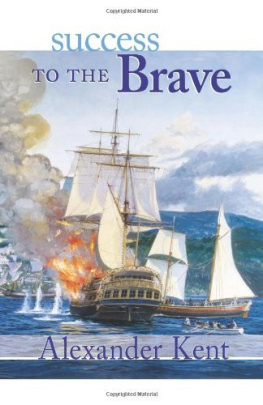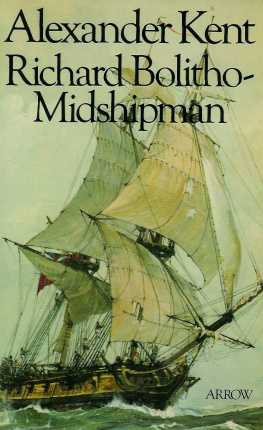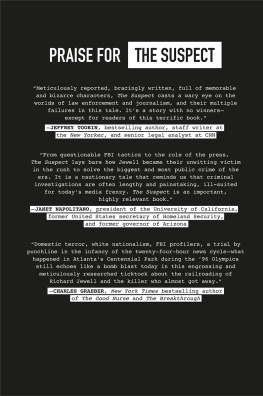Alexander Kent
A Tradition of Victory
(Bolitho 16)
God and the Sailor we alike adore
But only when in danger, not before:
The danger oer, both are alike requited,
God is forgotten and the sailor slighted.
John Owen
EVEN FOR the West Country of England the summer of 1801 was rare with its cloudless blue skies and generous sunlight. In Plymouth, on this bustling July forenoon, the glare was so bright that the ships which seemed to cover the water from the Hamoaze to the Sound itself danced and shimmered to lessen the grimness of their gun-decks and the scars of those which had endured the fury of battle.
A smart gig pulled purposefully beneath the stern of a tall three-decker and skilfully avoided a cumbersome lighter loaded almost to the gills with great casks and barrels of water. The gigs pale oars rose and fell together, and her crew in their checkered shirts and tarred hats were a credit to her ship and coxswain. The latter was gauging the comings and goings of other harbour craft, but his mind was firmly on the gigs passenger, Captain Thomas Herrick, whom he had just carried from the jetty.
Herrick was well aware of his coxswains apprehension, just as he could sense the tension from the way his gigs crew carefully avoided his eye as they feathered their blades and made the boat scud across the water like a bright beetle.
It had been a long, tiresome journey from Kent, Herricks home, and as the distance from Plymouth had fallen away he had started to fret over what he would discover.
His ship, the seventy-four-gun Benbow, had arrived in Plymouth barely a month back. It was incredible to believe that it was less than three months since the bloody fight itself, the one which was now called the Battle of Copenhagen. The small Inshore Squadron, of which Benbow was the flagship, had fought with distinction. Everyone had said so, and the Gazette had hinted that but for their efforts things might have gone very differently.
Herrick shifted on his thwart and frowned. He did not notice the stroke oarsman flinch under his stare, nor was he conscious of seeing him at all. Herrick was forty-four years old, and had made the hard and treacherous climb to his present appointment with neither influence nor patronage. He had heard it all before, and despised those who spoke of a sea-fight as if it were a kind of umpired contest.
Those sort of folk never saw the carnage, the broken bodies and minds which went with each encounter. The tangle of cordage and splintered timbers and spars which had to be put to rights without so much as a by-your-leave so that the ruin could be restored into a fighting ship and sent where she could be best used.
He glanced around the busy anchorage. Ships taking on stores, others being refitted. His eye rested on a lithe frigate, mastless and riding high above her reflection, uncluttered by guns and men, as she swung to her warps from a slipway.Just launched. He saw the waving hats and arms, the bright flags curling along her empty gunports, her growing confidence like that of a newly dropped colt.
Herrick frowned again. After eight years of constant war with France and her allies they were still short of frigates. Where would this one go? Who would command her and find glory or ignominy?
Herrick turned and looked at the young lieutenant who had come out to collect him with the gig. He must have arrived during his seven precious days in Kent. He was so pale and young, so unsure of himself that Herrick could barely see him as a newly joined midshipman, let alone a lieutenant. But the war had taken so many that the whole fleet seemed to be manned by boys and old men.
It was useless to ask him anything. He was scared of his own shadow.
Herrick glanced up at his square-shouldered coxswain as he steered the boat beneath another tapering bowsprit and glaring figurehead.
This shivering boy posing as a lieutenant had met him at the jetty, doffed his hat and had stammered in one breath, The first lieutenants respects, sir, and the admiral is come aboard.
Thank God the first lieutenant had been there to greet him, Herrick thought grimly. But what was Rear-Admiral Bolitho, an officer he had served in many parts of the world, a man whom he loved more than any other, doing aboard Benbow now?
It was easy to see him in those last moments outside Copenhagen. The smoke, the terrible din of falling spars and the jarring crash of cannon fire, and always Bolitho had been there. Waving them on. Driving them, leading them with all the reckless determination only he could use. Except that Herrick, who carried the pride deep within him of being his greatest friend, knew the real man underneath. The doubts and the fears, the excitement at a challenge, the despair at the waste of life if wrongly cast away.
Their homecoming should have been different for him above all others. This time there was a woman waiting. A beautiful girl who could and would be a reprieve from all which Bolitho had held dear and had previously lost. Bolitho had been going to London, to the Admiralty, and then back again to his home in Cornwall, that big grey house in Falmouth.
The gig straightened up on the last leg of the journey, and Herrick held his breath as he saw his ship stand out from the other anchored vessels, her black and buff tumblehome shining in the sunlight as a personal welcome. Only a professional seaman, and above all her captain, would see beyond the fresh paint and pitch, the blacked-down rigging and neatly furled canvas. The Benbows fat hull was almost hemmed in by lighters and moored platforms.
The air vibrated with the din of hammers and saws, and even as he watched another great bundle of new cordage was being swayed aloft to the mizzen topmast, the one which had been shot away in battle. But Benbow was a new ship and had the strength of two older consorts. She had suffered badly, but was out of dock, and within months would be at sea again with her squadron. In spite of his usual caution, Herrick was pleased and proud with what they had done. Being Herrick, it never occurred to him that much of the success had been due to his own inspiration and his tireless efforts to get Benbow ready for sea.
His eyes rested on the mizzen-mast and the flag which flapped only occasionally from its truck. The flag of a Rear-Admiral of the Red, but to Herrick it meant so much more. At least he had been able to share it with his new wife, Dulcie. Herrick had been married such a short time, and yet as he had given his sister away in marriage to the beanpole Lieutenant George Gilchrist, just four days back in Maidstone, he had felt like a husband of long years standing. He smiled, his round, homely face losing its sternness as he thought about it. His own ability to offer advice on marriage!
The bowman stood up with his boathook at the ready.
Benbow had risen right above the gig as Herricks mind had drifted away. Close alongside he could see the repaired timbers, the paint which now hid the blood from the scuppers. As if the ship and not her people had been bleeding to death.
The oars were tossed and Tuck, the coxswain, removed his hat. Their eyes met and Herrick gave a quick smile. Thank you, Tuck. Smart turnout.
They understood each other.
Herrick looked up at the entry port and prepared himself for the thousandth time. Once he had never believed he would ever hold his rank of lieutenant. The step from wardroom to quarterdeck, and now to being the flag-captain to one of the finest seaofficers alive, was even harder to accept.
Like the new house in Kent. Not a cottage, but a real house, with a full admiral living nearby and several rich merchants too. Dulcie had assured him, Nothing is too good for you, dear Thomas. Youve worked for it, you deserve far more.




